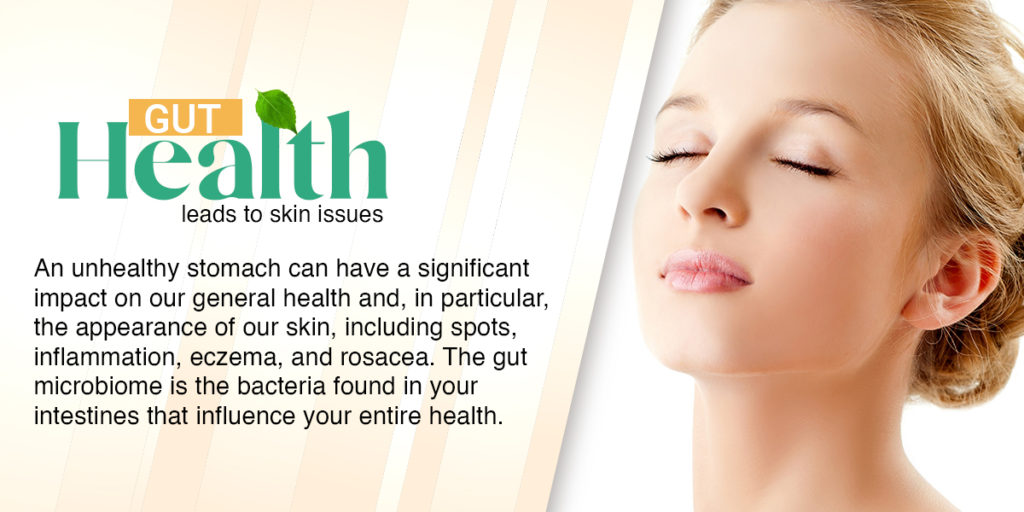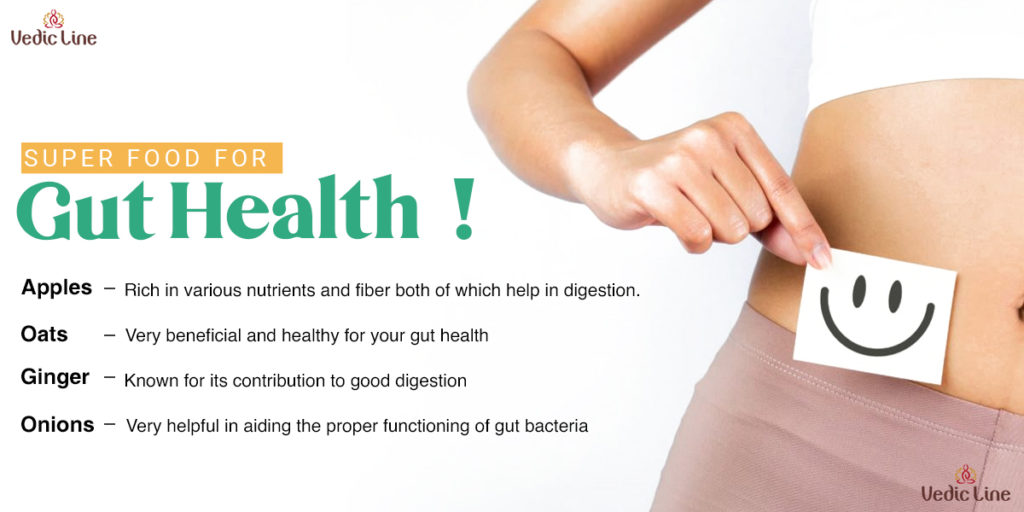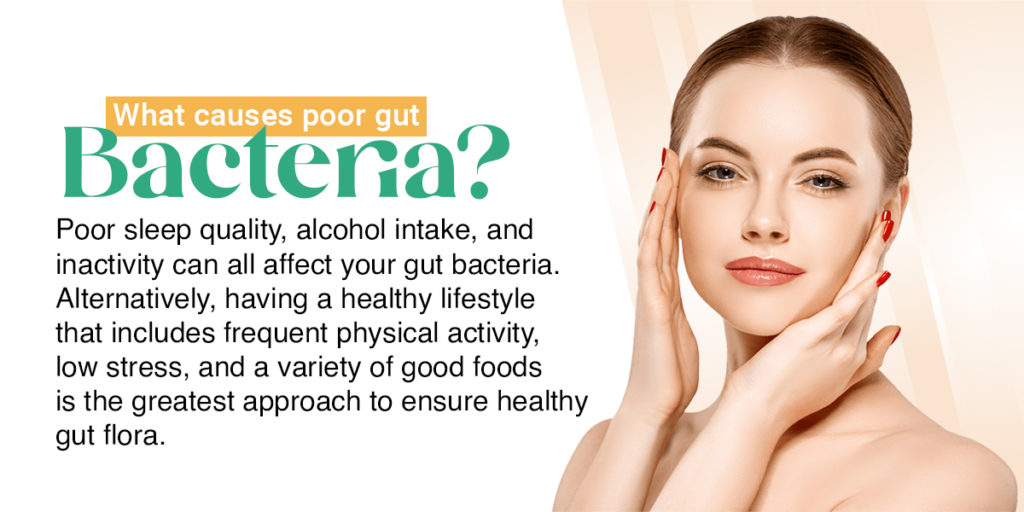Reasons Why Gut Health Is Vital For Having Beautiful Skin

In order for your skin to look and feel healthy, it requires a steady supply of vital vitamins and minerals besides lots of water. Your skin will eventually deteriorate if you restrict your body of these nutrients, such as by eating a diet high in sugar and saturated fat. You can tell you’re healthy both inside and out by looking at your skin, which should be clear and radiant. But in addition to a healthy diet, your gut health for skin, or more precisely, the bacteria in your stomach, may have the ability to affect the health of your skin.
What connections exist between gut and skin health?
Millions of “microbial cells” bacteria, viruses, and yeasts can be found in your stomach. Microbial cells come in “good” and “bad” varieties; the good ones protect your health while the bad ones work to ward off disease and illness.
These cells are crucial for food digestion and health. It’s interesting to note that there are more of these microbe cells than human cells.
However, your gut microbiome may occasionally be out of equilibrium. An imbalance occurs when there are either too many harmful bacteria or not enough beneficial bacteria
An imbalance may result from stress, a bad diet, or the use of antibiotics. Inflammation can arise in the body when the balance of bacteria in your stomach is out of whack. Here is where the importance of digestion relationship between gut health for skin and inflammation occurs.
How could a person’s gut health affect, or relieve acne, rosacea, and eczema?

Your gut health for skin can be greatly affected by what you put into your body, including food and nutrients.
The many trillions of bacteria that live in your gut are also fed by what you eat, so it provides more than simply sustenance for you.
Gut-skin Interaction
Poor gut health for skin is not a direct cause of bad skin. Instead, scientists believe that the imbalance in gut flora is a factor in the emergence of skin disorders including eczema and acne.
Both eczema & acne are inflammatory skin disorders that develop when the immune system battles harmful microorganisms.
Recent research suggests that restoring the balance of gut bacteria may have favorable effects on the gut health of the skin.
-
Product on sale
 Anti Acne BlendOriginal price was: ₹250.00.₹200.00Current price is: ₹200.00.
Anti Acne BlendOriginal price was: ₹250.00.₹200.00Current price is: ₹200.00. -
Product on sale
 Charcoal Acne Control Cream₹280.00 – ₹800.00
Charcoal Acne Control Cream₹280.00 – ₹800.00
What brings about an imbalance?
The following factors may affect your gut flora:
Antibiotics – Since antibiotics kill both healthy and bad bacteria, after one or more courses, the bad bacteria may replace the good.
Stress – sleep deprivation
Bad diet -which includes eating too many high-sugar and high-fat foods or not enough fruits, vegetables, and whole grains.
Tips To Enhance Gut Health For Skin

- Consume foods with low human intervention (HI).
- Eat prebiotic-rich meals. Prebiotics aid in accelerating the growth of beneficial bacteria. Foods high in soluble fiber are some examples of these non-digestible dietary components.
- Consume Lacto-fermented foods that are high in probiotics, such as yogurt, kefir, and sauerkraut.
- Prebiotics and probiotics work better together than they do separately to support a healthy gut.
- Choose Certified Organic foods whenever possible because they are far higher in nutrients and free of harmful chemicals that might harm gut health for skin.
- If your gut is in poor condition, it could take some time for it to heal and restore the effectiveness of your own digestive enzymes. In the short term, digestive enzymes might be beneficial.
- Eat more frequently, but in smaller portions. Chew your food thoroughly so that it dissolves before you swallow. Digestive enzymes in saliva assist in breaking down food.
- Drinking before a meal should be avoided as it dilutes the digestive enzymes.
- Unfriendly bacteria are encourage by an excess of acid in the body. Consume more alkalizing foods, such as your green leafy vegetables, and eat fewer acid-forming meals to lower the level of acidity in your body.
- The following herbs may be beneficial for digestive health: fennel, chamomile, slippery elm, ginger, peppermint, and lemon verbena.
- Given the prevalence of gluten and dairy sensitivity, it is usually better to steer clear of these foods since they contain indigestible proteins. Yogurt and other forms of fermented dairy are OK.
- Animal proteins should be cooked gently in soups and stews because they might be difficult to digest. Animal proteins can be enhance with flavors to make them easier to digest, like garlic, ginger, cumin, cayenne, and black pepper.
- It is recommended to steam or sauté veggies because eating too many raw vegetables can impair digestion.
- Meat bone broths are rich in minerals and other important elements and are fantastic for repairing the intestinal lining.

-
Product on sale
 Advanced Anti Pigmentation KitOriginal price was: ₹1,040.00.₹832.00Current price is: ₹832.00.
Advanced Anti Pigmentation KitOriginal price was: ₹1,040.00.₹832.00Current price is: ₹832.00. -
Product on sale
 Alpha Whitening D-Pigment and D-Tan Facial Kit 350mlOriginal price was: ₹1,300.00.₹1,040.00Current price is: ₹1,040.00.
Alpha Whitening D-Pigment and D-Tan Facial Kit 350mlOriginal price was: ₹1,300.00.₹1,040.00Current price is: ₹1,040.00. -
Product on sale
 Anti Pigmentation BlendOriginal price was: ₹250.00.₹200.00Current price is: ₹200.00.
Anti Pigmentation BlendOriginal price was: ₹250.00.₹200.00Current price is: ₹200.00.
Probiotics work and How
Live bacteria and yeast called probiotics are beneficial to your health, particularly your digestive system. Everybody has both beneficial and dangerous microorganisms in their bodies. The “Good” or useful “bacteria included in probiotics are frequently refer to as such since they support gut health for skin to improve gut health naturally.
Consuming fermented food and beverages
The beneficial bacteria present in fermented foods have been associated with enhancing immunity, promoting a healthy weight, and enhancing digestion.
Products like yogurt and pickles are examples of fermented foods. These foods are high in probiotics and the bacteria multiply during the fermentation process.
Bottom Line
For many elements of your Gut health for skin, your gut microbes are crucial. A disturbed microbiome has been linked to many chronic diseases, according to multiple research. Eating a variety of fresh, whole foods, primarily from plant sources is the greatest method to maintain a healthy microbiome.
